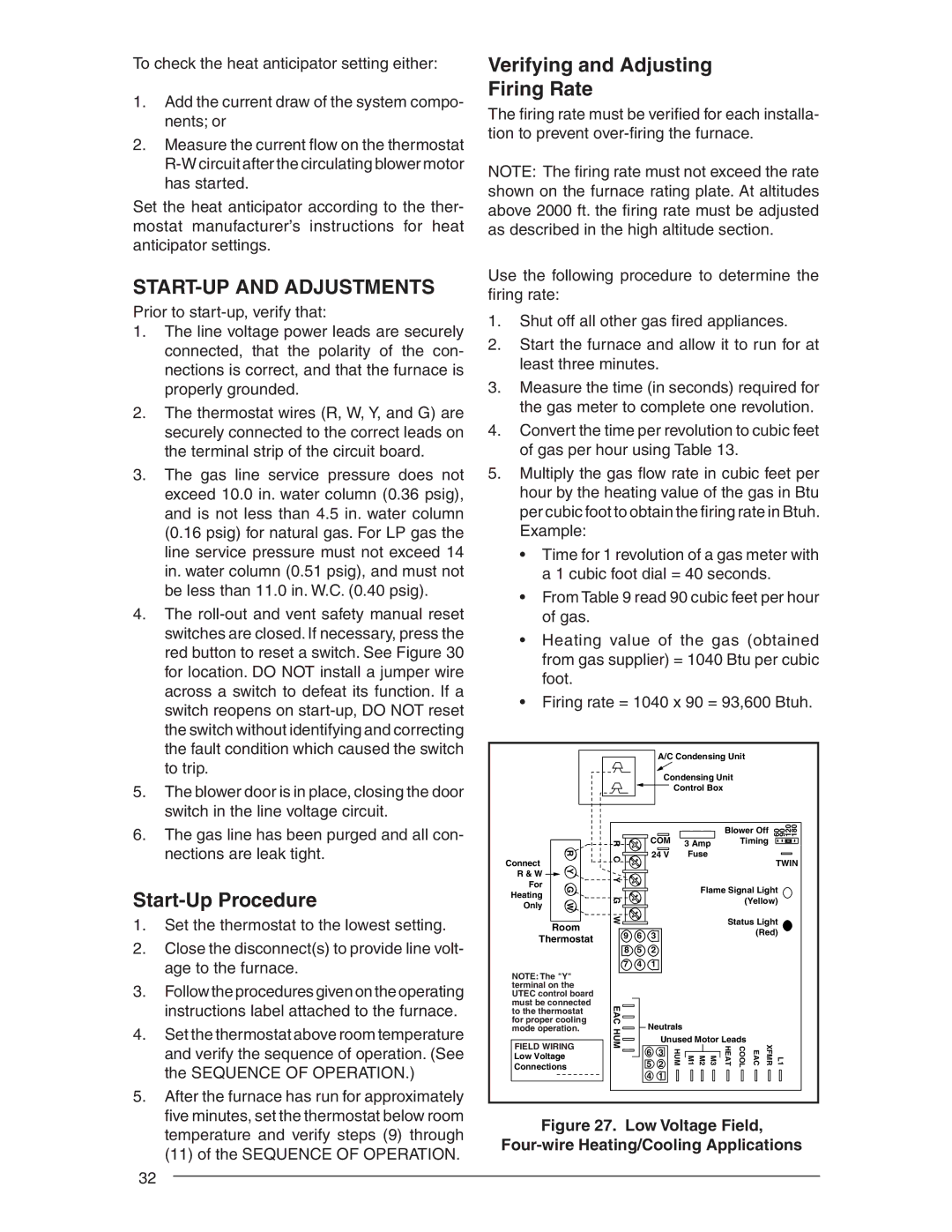
To check the heat anticipator setting either:
1.Add the current draw of the system compo- nents; or
2.Measure the current flow on the thermostat
Set the heat anticipator according to the ther- mostat manufacturer’s instructions for heat anticipator settings.
START-UP AND ADJUSTMENTS
Prior to
1.The line voltage power leads are securely connected, that the polarity of the con- nections is correct, and that the furnace is properly grounded.
2.The thermostat wires (R, W, Y, and G) are securely connected to the correct leads on the terminal strip of the circuit board.
3.The gas line service pressure does not exceed 10.0 in. water column (0.36 psig), and is not less than 4.5 in. water column (0.16 psig) for natural gas. For LP gas the line service pressure must not exceed 14 in. water column (0.51 psig), and must not be less than 11.0 in. W.C. (0.40 psig).
4.The
5.The blower door is in place, closing the door switch in the line voltage circuit.
6.The gas line has been purged and all con- nections are leak tight.
Start-Up Procedure
1.Set the thermostat to the lowest setting.
2.Close the disconnect(s) to provide line volt- age to the furnace.
3.Follow the procedures given on the operating instructions label attached to the furnace.
4.Set the thermostat above room temperature and verify the sequence of operation. (See the SEQUENCE OF OPERATION.)
5.After the furnace has run for approximately five minutes, set the thermostat below room temperature and verify steps (9) through (11) of the SEQUENCE OF OPERATION.
Verifying and Adjusting
Firing Rate
The firing rate must be verified for each installa- tion to prevent
NOTE: The firing rate must not exceed the rate shown on the furnace rating plate. At altitudes above 2000 ft. the firing rate must be adjusted as described in the high altitude section.
Use the following procedure to determine the firing rate:
1.Shut off all other gas fired appliances.
2.Start the furnace and allow it to run for at least three minutes.
3.Measure the time (in seconds) required for the gas meter to complete one revolution.
4.Convert the time per revolution to cubic feet of gas per hour using Table 13.
5.Multiply the gas flow rate in cubic feet per hour by the heating value of the gas in Btu per cubic foot to obtain the firing rate in Btuh. Example:
•Time for 1 revolution of a gas meter with a 1 cubic foot dial = 40 seconds.
•From Table 9 read 90 cubic feet per hour of gas.
•Heating value of the gas (obtained from gas supplier) = 1040 Btu per cubic foot.
• Firing rate = 1040 x 90 = 93,600 Btuh. | ||||||||
|
|
|
|
| A/C Condensing Unit |
| ||
|
|
|
|
| Condensing Unit |
| ||
|
|
|
|
|
| Control Box |
|
|
|
|
|
| COM |
| Blower Off 6090120180 | ||
| R | R |
| 3 Amp | Timing |
| ||
Connect | C |
| 24 V | Fuse | TWIN | |||
|
|
|
| |||||
Y |
|
|
|
|
| |||
R & W | Y |
|
|
|
|
|
| |
|
|
|
|
|
|
| ||
For | G |
|
|
|
|
|
| |
|
|
|
| Flame Signal Light |
| |||
Heating |
|
|
|
|
| |||
| G |
|
|
|
| (Yellow) |
| |
Only | W |
|
|
|
|
| ||
|
|
|
|
|
| |||
Room | W |
|
|
|
| Status Light |
| |
|
|
|
|
|
| |||
9 | 6 | 3 |
|
| (Red) |
| ||
Thermostat |
|
|
| |||||
|
|
|
| |||||
|
| 8 | 5 | 2 |
|
|
|
|
|
| 7 | 4 | 1 |
|
|
|
|
NOTE: The "Y" |
|
|
|
|
|
|
| |
terminal on the |
|
|
|
|
|
|
| |
UTEC control board |
|
|
|
|
|
|
| |
must be connected | EAC |
|
|
|
|
|
| |
to the thermostat |
|
|
|
|
|
| ||
for proper cooling |
| Neutrals |
|
| ||||
mode operation. | HUM |
|
|
| ||||
FIELD WIRING |
|
| Unused Motor Leads |
| ||||
| 6 | 3 | M3 M2 M1 HUM | XFMR EAC COOL HEAT |
| |||
Low Voltage |
|
| L1 | |||||
|
| 5 | 2 | |||||
Connections |
|
| ||||||
|
|
|
| 4 | 1 |
|
|
|
Figure 27. Low Voltage Field,
Four-wire Heating/Cooling Applications
32
